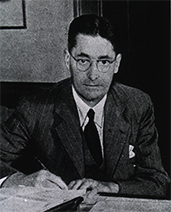-
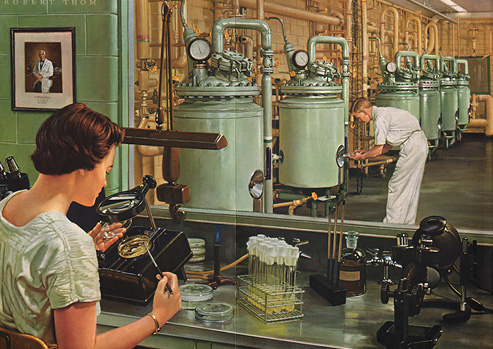
“The Era of Antibiotics,” painted by Robert A. Thom for Parke, Davis & Company, 1950s
Printed with Permission of American Pharmacists Association Foundation. Copyright 2009 APhA Foundation.
Penicillin research and production are depicted in this painting by Robert A. Thom, commissioned by Parke, Davis & Company as part of their “Great Moments in Pharmacy” advertising campaign in the 1950s.
-
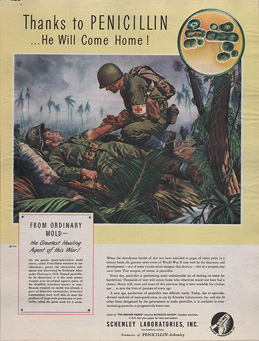
“Thanks to Penicillin…He Will Come Home!” penicillin advertisement, Schenley Laboratories, 1944
Courtesy Schenley Laboratories, Inc.
Advertising played a role in establishing the image of penicillin as the wonder drug.
Thanks to PENICILLIN … He Will Come Home!
FROM ORDINARY MOLD—the Greatest Healing Agent of this War!
On the gaudy, green-and-yellow mold above, called Penicillium notatum in the laboratory, grows the miraculous substance first discovered by Professor Alexander Fleming in 1928. Named penicillin by its discoverer, it is the most potent weapon ever developed against many of the deadliest infections known to man. Because research on molds was already a part of Schenley enterprise, Schenley Laboratories were well able to meet the problem of large-scale production of penicillin, when the great need for it arose.
When the thunderous battles of this war have subsided to pages of silent print in a history book, the greatest news event of World War II may well be the discovery and development—not of some vicious secret weapon that destroys—but of a weapon that saves lives. That weapon, of course, is penicillin.
Every day, penicillin is performing some unbelievable act of healing on some far battlefront. Thousands of men will return home who otherwise would not have had a chance. Better still, more and more of this precious drug is now available for civilian use…to save the lives of patients of every age.
A year ago, production of penicillin was difficult, costly. Today, due to specially-devised methods of mass-production, in use by Schenley Laboratories, Inc. and the 20 other firms designated by the government to make penicillin, it is available in ever-increasing quantity, at progressively lower cost.
Listen to “THE DOCTOR FIGHTS” starring RAYMOND MASSEY. Tuesday evenings, C.B.S. See your paper for time and station.
SCHENLEY LABORATORIES, INC.
Lawrenceburg, Indiana
Producers of PENICILLIN-Schenley -

“Fibres and spores of Penicillium notatum” penicillin advertisement, Squibb Laboratories, 1944
Courtesy National Museum of American History
“Growing in a liquid medium, this mold gives out golden droplets rich in penicillin—but the liquid must be concentrated over 30,000 times to obtain pure penicillin.”
-
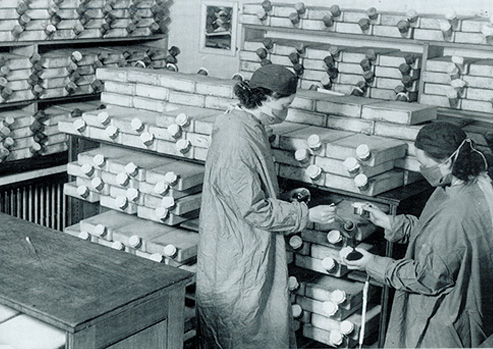
Penicillin manufacture at Oxford University, early 1940s
Courtesy Sir William Dunn School of Pathology, Oxford University
Six “Penicillin Girls” nurtured the growing mold and harvested the penicillin from the hundreds of culture vessels at the manufacturing operation established at Oxford University in 1940.
-
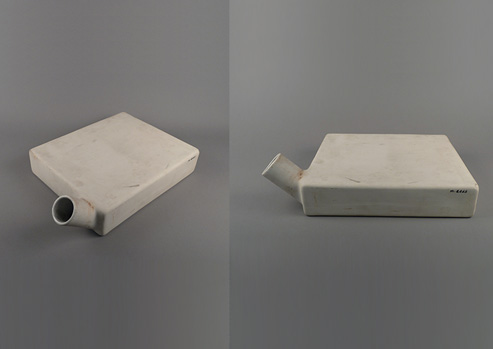
Penicillin culture vessel, 1940s
Courtesy National Museum of American History
-
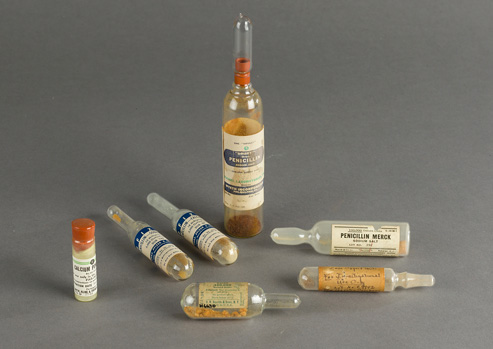
Penicillin products from American manufacturers, 1940s
Courtesy National Museum of American History
Unable to establish large-scale commercial production, the British turned to the United States in 1942. More than twenty American drug companies joined the U.S. government’s penicillin production effort. Industrial fermentation tanks replaced small vessel production and by 1944 penicillin supplies met military needs.
-
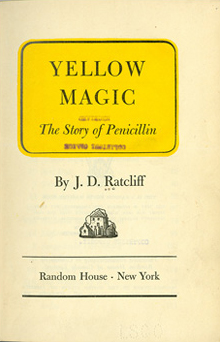
Yellow Magic: The Story of Penicillin, by J. D. Ratcliff, 1945
Courtesy Random House
The publication of Yellow Magic: The Story of Penicillin in 1945 celebrated the achievement of the American drug companies engaged in penicillin production.
Page 1
Title page that reads “Yellow Magic: The Story of Penicillin by J. D. Ratcliff. Random House—New York”
Page 2
Photo of the outside of a penicillin plant featuring many cylindrical towers, tanks, and connecting pipes with caption text reading- “Penicillin, which started life as a laboratory curiosity, has grown into a giant industry. Over $20,000,000 has been spent on plants such as this.”
Page 3
Photo of eight conical Erlenmyer flasks containing Penicillium mold with caption text reading-“Microphotograph of fronds of Penicillium mold. The crinkled green mold growing in these flasks is Penicillium notatum, producer of penicillin. The magic drug is found in the broth on which the mold grows.”
Page 4
Photo of two hands holding a petri dish showing circular areas where penicillin killed bacterial growth with caption text reading-“Rings on the plate show where penicillin has destroyed microbes.”
Page 5
Photo of two people in gowns, hoods and face masks pour liquid from one large conical flask into another with caption text reading-“When mold growth is complete, the broth containing penicillin is harvested under rigidly aseptic conditions. Such necessary precautions account for penicillin’s high cost.”
Page 6
Photo of man in white gown holds a mouse while a woman injects penicillin into the mouses’s tail end with caption text reading-“Each batch of drug produced must be tested for impurities. These mice will tell whether the drug contains any toxic contaminants.”
Page 7
Photo of nine rabbits held in a long stockade style box. A woman in white lab coat holding a thermometer stands next to them with caption text reading-“Rabbits in this test tell whether penicillin contains any fever-producing impurities. If rabbit temperatures rise perceptibly the penicillin under test is discarded.”
Page 8
Photo of trays with small bottles on a large circular surface; workers are visible around the perimeter with caption text reading-“Finished penicillin must be bottled under conditions far more sterile than those prevailing in any operating room. Microbe-killing ultra-violet lamps shine on the workers in these pictures. The rooms are under slight pressure so that sterile air will leak out, instead of contaminated outside air leaking in.”
Page 9
Photo of an enlarged view of penicillin crystals with caption text reading-“This picture shows pure, crystalline penicillin, produced at enormous cost. Study of such crystals will give chemists clues about making the drug synthetically.”
-
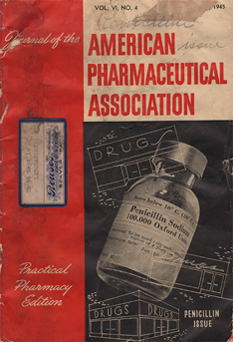
“Penicillin Issue” cover of Journal of the American Pharmaceutical Association, April 1945
Courtesy National Museum of American History
In April 1945, the American Pharmaceutical Association published a special penicillin issue to educate retail pharmacists about the new drug. Companies engaged in penicillin manufacture used the opportunity to promote their brand and stake a claim in the expanding market.
Cover page (Page 1) Journal of the AMERICAN PHARMACEUTICAL ASSOCIATION
Pharmaceutical booklet cover with a photograph of a vial and graphic illustrations of drug stores.
VOL. VI, NO. 4
1945Journal of the AMERICAN PHARMACEUTICAL ASSOCIATION
[Cover image shows a medicine bottle with labeled “Penicillin Sodium” with line drawing of three buildings with the sign “DRUGS” on each.]
Practical Pharmacy Edition
PENICILLIN ISSUE
[A label on the left side reads, “To be kept in LABORATORY, Rouse’s Drug Store, Beaver, PA, PHONE 1066]
Pages 2-3: Abbot Advertisement
Pharmaceutical advertisement with photographs of factories, physicians, vials and packaging.
NOW Released for Distribution Through Prescription Pharmacies Penicillin, Abbott
Views of Abbott’s great new Penicillin plant in North Chicago
Backed by the force of the Abbott nation-wide program of detailing
Advertising of Penicillin, Abbott, to physicians now greatly increased
Selling helps designed to increase profits and enhance your prestige
A LEADER IN PENICILLIN RESEACH AND PRODUCTION
Stock, Feature and Push PENICILLIN, ABBOTT, NOW Because—
1. You will gain both profit and professional prestige by being among the first to distribute this dramatic life-saving drug in your community.
2. Penicillin, Abbott, is backed by more than three years of research, d development and manufacturing experience in this important field by one of America’s foremost makers of ethical research products for medicinal use- a manufacture whose name is your guarantee of immediate and maximum physician acceptance.
3. Specification and preference for Penicillin, Abbott, are now being created by one of the most effective detailing organization in the county.
4. Penicillin, Abbott, has been advertised in the United States for more than a year and a half.
5. Advertising of Penicillin, Abbott, to physicians is now stepped up to truly major scale.
6. You are given, free of charge, immediate, direct and effective aid in channeling professional demand for Penicillin to your pharmacy.
First, with your initial order for Penicillin, Abbott, your will be supplied, upon request, thirty bulletin cards, printed on Government postals and imprinted with your store name and address, all ready for mailing to physicians in your neighborhood of community, to tell them that you have the Abbott brand of this important drug in stock for their needs.
Second, with your initial order, you are supplied with the beautiful, prestige-building counter or hanging sign illustrated at the lower left—a sign which emphasizes your importance as a professional man who is abreast of the most recent medical advances.
Order at once through your usual source of supply. Mention the sign and bulletin cards if you’d like them, giving imprint copy for the latter. Penicillin, Abbott, is supplied in cartons of five 20-cc. rubber-capped vials, each containing 100,000 Oxford units of Penicillin and one 20-cc. vial of sterile isotonic sodium chloride solution, U.S.P., to be used as a solvent. We suggest that about one-third of your total order be for the Combination Packages—And that you act immediately.
A product with a brand name which assures wide physician acceptance.
Abbott Laboratories – North Chicago, Illinois
Pages 4-5: Commercial Solvent Advertisement
Pharmaceutical advertisement with photographs of factories, scientists in a laboratory, physicians, vials and packaging.
JOURNAL OF THE AMERICAN PHARMACEUTICAL ASSOCIATION
WHY IT WILL PAY YOU TO SELLPenicillin-C.S.C.-made in one of the world’s largest plants, equipped for foremost efficacy and integrity of production – is backed by 25 years of research and experience in large-scale manufacture by microbiotic procedures.
It is assayed, bacteriologically as well as biologically, to safeguard its potency, sterility, nontoxicity, and freedom from fever-inducing pyrogens.
The high state of purification reached by Penicillin-C.S.C. is indicated by the notably small amount of substance required in the vial to present 100,000 Oxford Units. It assures high therapeutic efficacy and virtual freedom from the undesirable reactions attributed by many investigators to inadequate purification. The enormous production of Penicillin-C.S.C.—fully 800,000 vials of 100,000 Oxford Units each per month – assures you of adequate supply. Your orders will not be “shorted.”
1. Vial Filling; note precautions used.
2. Drying Penicillin-C.S.C. under high vacuum.
3. Vial sealing and capping.
4. Testing for nontoxicity.
Mention the Journal of the A. Ph. A. when writing advertisers—It identifies you.
ADVERTISERS’ SECTION
PENICILLIN-C.S.C
PreferentiallyNo other penicillin has been so widely promoted to the medical profession, in a long list of medical journals, by mail, and through helpful scientific literature.
Every physician knows Penicillin-C.S.C. and ranks it high. There will be no “sales resistance” when you offer it preferentially.
No need of a large stock for you; your wholesaler is supplied, and will always be able to replenish your stock quickly.
Make your pharmacy a “library of information” on penicillin by writing us for your copies of the three pieces here shown – the Penicillin-C.S.C. Reporter, presenting abstracts of latest publications, the Penicillin-C.S.C. Therapeutic Reference Table, and a comprehensive brochure.
PHARMACEUTICAL DIVISION
COMMERCIAL SOLVENTS Corporation
17 East 42nd Street New York 17, N.Y.The combination package provides two vials – one containing 100,000 Oxford Units of Penicillin-C.S.C., the other 20 cc. of pyrogen-free normal saline solution.
Mention the Journal of the A. Ph. A. when writing advertisers—It identifies you.
Page 6: Heyden Advertisement
Pharmaceutical advertisement with vials and packaging.
PENICILLIN-Heyden
The package illustrated is supplied to the Armed Forces and for direct export, Distributors of Heyden Penicillin in the United States sell under their own labels.
A pioneer producer of Penicillin, Heyden is proud to announce the position it has achieved through the efforts of the combined Heyden scientific and technical staffs.
Industrial fermentation processes have been a subject of close study by the Heyden research organization over a long period of years.
Benefits accruing from this work have contributed materially in the production of Penicillin.
Commercial production began early in 1944, following active participation in the Research Program sponsored by the Office of Scientific Research and Development and the War Production Board.
Heyden is now a leading producer of Penicillin, Penicillin Sodium-Heyden has been accepted by the Council on Pharmacy and Chemistry of the American Medical Association.
Over and above the needs of the Armed Forces, a substantial percentage of the Penicillin production is now made available for civilian use through distributors of the Heyden product.
Penicillin for research use is supplied direct from Heyden to the user. As a service to research laboratories and the industries, an efficient consulting staff is available for discussion of new applications of Penicillin and its derivatives.
HEYDEN Chemical Corporation
393 Seventh Avenue, New York 1, N.Y.
Benzaldehye, Benzoates, Benzoic Acid, Benzyl Chloride, xx, xx, Medicinal Creosotes, Formates, Formaldehyde, Formic Acid, Glycerophosphates, Medicinal Guaiocols, xx, xx, Parahydroxybenzoates, Penicillin, Pentaerythritols, SalicylatesPage 7: Parke-Davis Advertisement
Pharmaceutical advertisement with graphic wooden sign post.
ADVERTISERS’ SECTION
IX
PENICILLIN IS NOW AVAILABLE IN PINE CREEK
Yes…and in Paterson, Portland, Pittsburgh and Pocatello… for this new antibiotic is now being distributed through the same channels which make other Parke-Davis prescription products available to the physicians and pharmacists of the country. In the short space of five years Penicillin has developed from a mold on a petri dish in a London laboratory to a package on the shelves of the prescription rooms of fifty odd thousand retail pharmacies throughout the United States.
To the triumphs of Fleming and Florey must be added the genius of American pharmaceutical production which rapidly developed the means and methods of mass manufacture in sufficient quantity to meet first, the needs of the armed forces; next, the demands of critical civilian cases; then, to supply limited quantities to selected hospitals throughout the country, and finally to release Penicillin for general distribution.
Physicians may now prescribe… and pharmacists dispense…
PENICILLIN
PARKE-DAVIS
PARKE, DAVIS & COMPANY
DETROIT 32, MICHIGAN
Mention the Journal of the A. Ph. A. when writing advertisers—It identifies you.
Page 8: Squibb Advertisement
Pharmaceutical advertisement with a graphic of a wax seal for penicillin.
ADVERTISERS’ SECTION
XIII
PENICILLIN…PENICILLIN…PENICILLIN…PENICILLIN…
RELIABILITY, UNIFORMITY, PURITY, EFFICACY, E.R. SQUIBB & SONS
Now that you can stock penicillin…
What brand will your doctors want?
There are many sound reasons why physicians will specify Penicillin Squibb. A pioneer in penicillin research, Squibb was one of the three original American companies to receive the first Oxford culture from England in 1940. From that day, Squibb has been identified with every landmark in penicillin development from petri dish to mass production in fifteen-thousand-gallon fermentation tanks. That is why Squibb not only stands in the first rank of the world’s largest penicillin producers, but also makes a penicillin unexcelled for potency, purity and dependability.
For 87 years, the name Squibb has meant fine pharmaceuticals- products physicians can trust. Every single vial of Penicillin Squibb is made by Squibb, under rigid Squibb control, by methods perfected in the Squibb Development and Manufacturing Laboratories. You will have many calls for Penicillin Squibb. Place your orders now!
SQUIBB
Penicillin SODIUM
MANUFACTUING CHEMISTS TO THE MEDICAL PROFESSION SINCE 1858
Mention the Journal of the A. Ph. A. when writing advertisers—It identifies you.
Page 9: Upjohn Advertisement
Pharmaceutical advertisement with graphic of a building.
ADVERTISERS’ SECTION
XI
Penicillin Released
ON AND AFTER MARCH 15, PENICILLIN UPJOHN WILL BE AVAILABLE THROUGH THE USUAL DRUG CHANNELS.
Upjohn
KALAMAZOO 99, MICHIGAN
FINE PHARMACEUTICALS SINCE 1886
Mention the Journal of the A. Ph. A. when writing advertisers—It identifies you.
Page 10: Wyeth Advertisement
Pharmaceutical advertisement with photographs vials and packaging, and how to remove fluid with a needle.
ADVERTISERS’ SECTION
XV
Wyeth
REG. U.S. PAT. OFF.
THE WYETH
VIPULE
GIVES YOU
“Laboratory fresh”
PENICILLIN SOLUTION
The Vipule is a special glass container in which Penicillin, Wyeth, is reduced to a dry powder from the frozen state under high vacuum.
The flame-sealed Vipule container, exclusively Wyeth, provides prolonged protection of the delicate product against air, moisture, and other deleterious influences.
Unbroken, the Vipule retains the potency of the penicillin so effectively that it remains stable over long periods…a highly important feature with this sensitive antibiotic.
THE VIPULE provides a Closed-System technique for restoring penicillin into “LABORATORY FRESH” sterile solution.
THE WYETH VIPULE* PENICILLIN PACKAGE: The Closed- System Unit
One Vipule contains 100,000 Oxford units of Penicillin, Wyeth; the other Vipule containing the diluent (20 cc. of sterile, pyrogen-free normal saline solution) is fitted with double-pointed Vipule needle.
Solutions are prepared quickly without the aid of a syringe:
1. Snap the glass cap from the penicillin Vipule at the plainly visible etched groove. Turn down sleeve of rubber stopper over neck of Vipule.
2. Snap the cap from the Vipule with diluent to expose the free end of the double-pointed Vipule needle.
3. Invert vial portion of the diluent Vipule over the upright penicillin vial and push downward so that the ends of the needle penetrate both diaphragms.
The “Laboratory Fresh” Penicillin solution is now ready for withdrawal and administration.
*REG. U.S. PAT. OFF.
REICHEL DIVISION
WYETH INCORPORATED
PHILADELPHIA 3, PA.
Wyeth
Mention the Journal of the A. Ph. A. when writing advertisers—It identifies you.
-
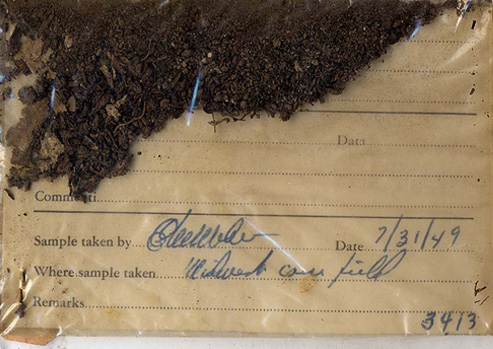
Soil sample, Charles Pfizer and Company, 1949
Courtesy National Museum of American History
Soil, naturally rich in microbial life, became an important source for antibiotic discovery. The Pfizer company alone tested over 100,000 soil samples from around the world, as drug companies competed to develop new products. This envelope of soil, from a cornfield in the Midwest, yielded a winning microbe and led to a successful new antibiotic named Terramycin.
-
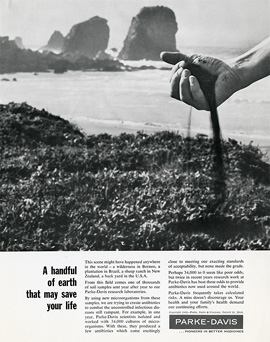
“A handful of earth that may save your life” penicillin advertisement, Parke, Davis & Company, 1962
Copyright © Pfizer Inc. All rights reserved.
The Parke Davis company tested thousands of soil samples each year for new microorganisms. Advertisements in popular magazines highlighted the enormous research effort required to produce one or two useful products.
A handful of earth that may save your life
This scene might have happened anywhere in the world – a wilderness in Borneo, a plantation in Brazil, a sheep ranch in New Zealand, a back yard in the U.S.A.
From this field comes one of thousands of soil samples sent year after year to our Parke-Davis research laboratories.
By using new microorganisms from these samples, we are trying to create antibiotics to combat the uncontrolled infectious diseases still rampant. For example, in one year, Parke-Davis scientists isolated and worked with 34,000 cultures of microorganisms. With these, they produced a few antibiotics which came excitingly close to meeting our exacting standards of acceptability, but none made the grade.
Perhaps 34,000 to 0 seem like poor odds, but twice in recent years research work at Parke-Davis has beat these odds to provide antibiotics now used around the world.
Parke-Davis frequently takes calculated risks. A miss doesn’t discourage us. Your health and your family’s health demand out continued efforts.
Copyright 1962-Parke, Davis & Company, Detroit 32. Mich.
PARKE-DAVIS
…PIONEERS IN BETTER MEDICINES
-
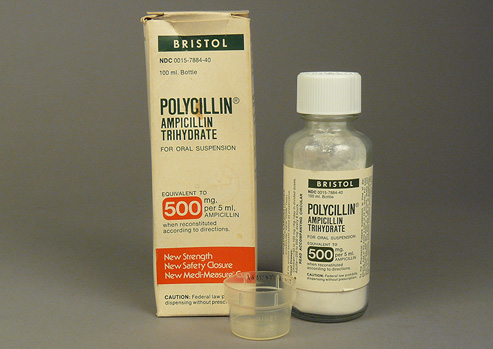
Polycillin oral antibiotic, Bristol-Myers Company, 1977
Courtesy National Museum of American History
New penicillins, such as ampicillin (brand name Polycillin) developed in the 1960s, were effective for treating many common infections. Oral formulas made taking the medicine more convenient. Doctors and patients came to rely on antibiotics even in uncertain diagnoses.
-
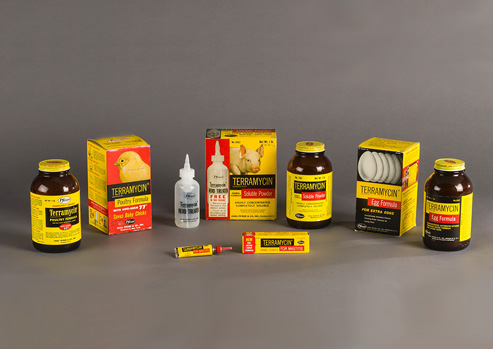
Terramycin products, Charles Pfizer and Company, early 1960s
Courtesy National Museum of American History
Antibiotics provided livestock producers with a means to control the infections that spread quickly through large herds and feed lots. After researchers discovered that these antibiotics had the side effect of promoting growth, drug companies developed low-dose antibiotic products that could be added to the daily feed.
-
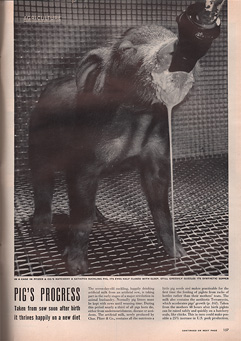
“Pig’s Progress,” LIFE, December 3, 1951
Courtesy © 1951 Time Inc. Reprinted with permission. All rights reserved. Image by Albert Fenn. ©Time Inc. Used with permission. All rights reserved.
A piglet thrives on a formula of artificial milk and Terramycin, an antibiotic, developed to accelerate growth in animals.
IN A CAGE IN PFIZER & CO.’S HATCHERY A SATIATED SUCKLING PIG, ITS EYES HALF CLOSED WITH SLEEP, STILL GREEDILY GUZZLES ITS SYNTHETIC SUPPER
PIG’S PROGRESS
Taken from sow soon after birth it thrives happily on a new diet
The seven-day-old suckling, happily drinking artificial milk from an artificial sow, is taking part in the early stages of a major revolution in animal husbandry. Normally pig litters must be kept with sows until weaning time. During this period nearly a third of all pigs born die, either from undernourishment, disease or accidents. The artificial milk, newly produced by Chas. Pfizer & Co., contains all the nutrients a little pig needs and makes practicable for the first time the feeding of piglets from racks of bottles rather than their mothers’ teats. The milk also contains the antibiotic Terramycin, which accelerates pigs’ growth (p. 161). Taken from the mothers 48 hours after birth piglets can be raised safely and quickly on a hatchery scale, like chicks. This in turn could make possible a 25% increase in U.S. pork production.
-
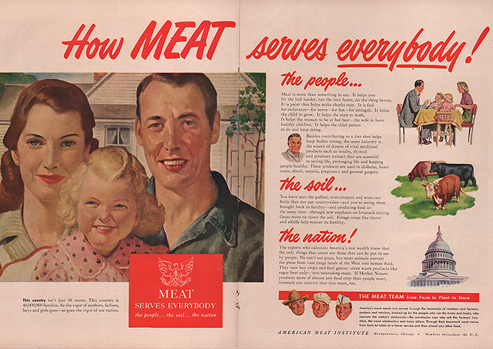
“How Meat Serves Everybody!” LIFE, November 14, 1949
Courtesy National Museum of American History
Meat production and consumption expanded rapidly along with the prospering American economy in the years following World War II. This advertisement from the American Meat Institute emphasizes the benefits of meat for human health, the economy, and soil conservation.
MEAT SERVES EVERYBODY
This country isn’t just 48 states. This country is 40,000,000 families. As the vigor of mothers, fathers, boys and girls goes- so goes the vigor of our nation.
the people…
Meat is more than something to eat. It helps you hit the ball harder, run the race faster, do the thing better. It is paint that helps make cheeks rosy. It is fuel for endurance- for nerve- for fun- for strength. It helps the child to grow. It helps the man to work. It helps the woman to be at her best- the wife to have healthy children. It helps the older person to do and keep doing.
Besides contributing to a diet that helps keep bodies strong, the meat industry is the source of dozens of vital medicinal products such as insulin, thyroid and pituitary extract that are essential to saving life, prolonging life and keeping people health. These products are used in diabetes, heart cases, shock, anemia, pregnancy and general surgery.
the soil…
You have seen the gullied, over-cropped and worn-out fields that dot our countrysides- and you’re seeing them brought back to fertility- and producing food at the same time- through new emphasis on livestock raising. Grass roots tie down the soil. Forage crops like clover and alfalfa help restore its fertility.
the nation!
The experts who calculate America’s real wealth know that the only things that count are those that can be put to use by people. We can’t eat grass, but meat animals convert the grass from vast range lands of the West into human food. They turn hay crops and feed grains- even waste products like sugar beet pulp- into nourishing meat. If Mother Nature produces more of almost any food crop than people want, livestock can convert that into meat, too.
THE MEAT TEAM from Farm to Plant to Store
America’s meat needs are served through the teamwork of ranchers and farmers, packers and retailers, backed up by the people who run the trains and trucks, who operate the nation’s stockyards- the commission men who sell the farmers’ livestock, the meat wholesalers and many others. Through their teamwork meat moves from farm to table at a lower service cost than almost any other food.
AMERICAN MEAT INSTITUTE Headquarters, Chicago–Members throughout the U.S.
-
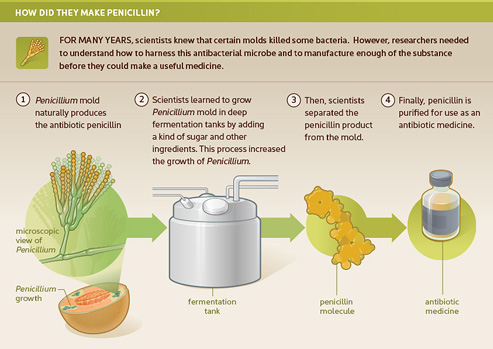
![]() Microbes are equipped with defense mechanisms to help ensure their survival. Penicillium, the bluish-green mold that grows on stale food, produces a substance that has the power to kill its bacterial competition. Many of these bacteria are also deadly to humans.
Microbes are equipped with defense mechanisms to help ensure their survival. Penicillium, the bluish-green mold that grows on stale food, produces a substance that has the power to kill its bacterial competition. Many of these bacteria are also deadly to humans.
In the years leading into World War II, British scientists established the life-saving potential of Penicillium’s natural antibiotic. Prompted by the war emergency, the United States government teamed with drug companies to mass-produce penicillin. The ability of the drug to prevent fatal infections among the wounded inspired the nickname “yellow magic.”
The anti-infective power of penicillin and other antibiotics has led to their overuse in medicine and agriculture, resulting in the emergence of drug-resistant bacteria that threaten human health.


